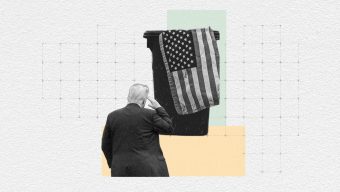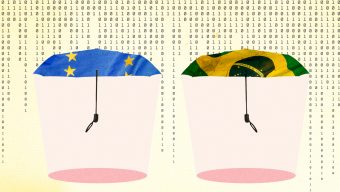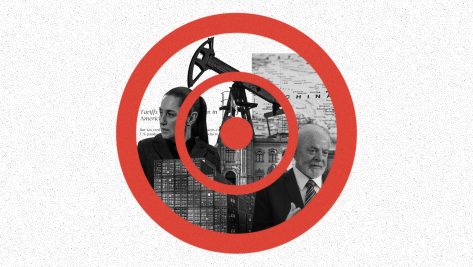Jacinda Ardern on the Challenges to Democracy
Jacinda Ardern, Prime Minister of New Zealand, sits down with Manuel Muñiz, Provost of IE University, to discuss global polarization, threats to liberal principles, and how technology can be used to reinforce democracy.
This conversation was held as part of the Tech4Democracy initiative from the IE Center for the Governance of Change.
© IE Insights.
Transcription
Manuel Muñiz: My first question is, in the academic world, there’s this discussion, and in the policy world as well, that the world is becoming more illiberal. That the international liberal order is what’s at stake at the moment in global politics. That we’re moving to a world that is less multilateral, a world where the rights of minorities are under threat, a world that is less democratic. Do you think that that’s the case?
Do you perceive the world as becoming more illiberal and some of these fundamental values and principles being at threat more than in the past? Certainly from the period in which I’ve had the privilege of being the Prime Minister of New Zealand, I do see an increasingly polarized world.
Jacinda Ardern: I do see the threats of the rise of protectionism, the challenging of international rules and norms, threats to individuals’ human rights and in some places, the championing of indigenous rights and ethnic minorities. But at the same time, you see a dilution of those rights in some places and the challenging of LGBTQI+ or even women. And so what is that a manifestation of?
In each individual country, there will be particular circumstances that may be giving rise or contributing to what we’re seeing. But I think often it can be distilled down into the very simple concept of fear. We are a trading nation. We are so reliant on the world being open to the exchange of goods and services with New Zealand. And yet, when I see some of the narratives around protectionism, often it’s a response to what is an individual fear that exists around the increasing financial insecurity that individuals feel.
The fact that in this rapidly changing world, people question whether or not their children will have the financial means to create the stability in life for themselves that maybe the prior generation had. And politicians, often when they are quick to respond to these issues, may seek the simple answers. Some may say it’s globalization. Some may say it’s trade that is threatening your jobs and your children’s future, when actually the answer is the opposite.
So it is incumbent on us, I think, as leaders, to not respond and feed the fear that exists in our population, rather to share a message of hope and model the solutions that exist. So for us, it’s our Trade for All agenda. It’s saying do not turn to protectionism, turn to trade as a tool to actually respond to the needs of our indigenous communities, to women, to small and medium sized enterprises, let’s show that it’s an answer, not a problem.
MM: It’s a fascinating topic because, you know, in principle, there are two forces shaping this environment. There’s sort of an international force, the rise of illiberal power. Some people are pointing to Russia, a more revisionist Russia since the 90s and others perhaps the rise of China and other actors that are more illiberal. But also this domestic element, this sort of implosion, the sort of questioning of fundamental liberal principles, including trade, regional integration, cosmopolitanism, and the integration of diversity, in our society from within the democratic, liberal world.
And here’s my question. So how do democracies renew their promise? How do democracies deliver? How do they regain output legitimacy in front of these other models that are less democratic, less liberal?
JA: We have to all acknowledge the imperfections in our own systems and the fact that we all grapple in different ways with these challenges. The first thing for me is just bringing it back to the very simple concept that regardless of where any individual sits on the political spectrum, regardless of their views on what we call conscience issues. So these moral debates that you hear in society: abortion, the rights of our gay community, and so on. For me, distilling it back to the simple concept of ensuring everyone’s fundamental human rights are protected.
That means that I absolutely protect you to have your religious views and values, your ability to believe and practice is protected. But so too is an individual’s right to manage their own health, manage their own relationships. What we need to ensure is that everyone feels protected in their rights but do not allow their own perspectives to impose or remove the rights of others.
The second area, I think a principle that’s really important is making sure that regardless of where you sit on a spectrum, that you feel heard. Now, that doesn’t mean you’ll always see the outcomes that you wish for, that’s democracy, but that you feel heard. And that is, I think, a challenge now in an environment where feeling heard and feeling as if you’re engaged in debate and dialog means that the fundamental premise of you at least all debating from the same starting point, your foundation is that you all agree what the facts are, even that has been challenged now.
And that I see as a direct threat to our ability as communities and as democracies to navigate large challenges and build consensus. If that fundamental principle that your starting point is that you at least agree the facts of the debate that you’re having, if that is undermined, then that is a huge disrupter to society.
And this is where technology plays both a role as disrupter, possible solution, but at the moment, problem, because this is a space where we see increasing disinformation. And so that ability to build consensus from that clear starting point, that clear, solid foundation, is really threatened.
MM: Let me ask you a quick question on technology, because part of this debate about authoritarianism, democracy, liberalism, the illiberal world, it has a technological sort of underbelly. This idea that emerging technologies, when used for massive surveillance, for repression, for targeting minorities and dissent, can enable these authoritarian states to do things that they wouldn’t have been able to do in the past. But also the effects of these technologies on open and liberal societies, both in the public debate space, but also in other spaces.
So when you look at this huge question of governing emerging technologies from a democratic point of view, and I know New Zealand has been on the forefront of some of these discussions and debates, particularly on the regulation of the public debate space. But more broadly first, how do you think democracies should address this challenge of governing technological transformation?
JA: I think the number one principle from our perspective would be: you cannot do it on your own. I think when as you’ve described, the broad spectrum that we’re dealing with, on the one hand, the perspective that technologies can be used by authoritarian states in a particular way by being so heavily controlled.
And on the other hand, in liberal democracies, where we’re seeking an open and free and transparent Internet, and ensuring that the rules governing that space adhere to those principles, any move that can be seen to be an overreach immediately slides you down the wider spectrum and leaves you open to accusation of acting in an authoritarian way.
So from our perspective, yes, does government have a role? Absolutely. We are the ones that create the rules as regulators. But we need to engage much more closely and collaboratively with civil society. No one believes that the Internet is a space where we want to allow extremism and violence and terrorism. And the combination of those things, whether or not it’s the radicalization that leads you there or the ability to broadcast that ideology, that is a good, clear starting point where civil society, government, and tech companies can all agree. So good.
Let’s then start the conversation around how does that manifest from a regulatory sense, but also whilst adhering to those simple principles of an open and transparent and accessible Internet. So that would be for me fundamental, we’ve got to do it together.
MM: A final question on this issue of hate speech and of the regulation of the public debate space, because we’ve seen over the past few years how social media has become a big arbiter of our public debate. And, how we regulate this is an extremely complicated debate around the world. I think you’ve suffered the effects of hate speech being spread on social media and having real world effects.
And I know New Zealand is leading on the response to this. I think that would be something wonderful to end our conversation on. What are you doing on this? And how do you think other countries around the world could learn from your experience so far in trying to tackle this issue?
JA: Look, I think one of the challenges that we have is that we have multiple regulatory environments now. Traditional media, of course, have always been treated as broadcaster and publisher and there are accountabilities that sit with that role. New forms of communication are treated not as publisher, but as postman. Where there are no obligations that exist. You provide a platform, but it’s for those who individually communicate on those platforms to be held responsible.
Now, that is an incredibly difficult environment to maintain a set of standards around. And so New Zealand, like every other country, is navigating its own regulatory environment in that space, just as the EU has gone through that process. But outside of that, I’d say there are some simple principles. Tech companies and operators need to just uphold their own terms of service. Actually, when you read those terms of service, they’re very hard to argue with, but it’s the way they are operationalized that’s often quite difficult.
And you hear from our communities, in those minority communities who are often at the sharp end of that, that often it’s just if the terms of service were upheld, it would make a big difference. So we need to keep calling on companies to demonstrate their responsibility.
The second thing, is that we need to create an environment where we understand the impact of our own behavior online. I think if we only ever think that the response, the responsibility in this space either sits with company or government, we will fail. Because there will always be a point at which our rules will fall or be inadequate in a very dynamic environment.
So what do we do to teach our kids resilience in this space? Resilience to disinformation, resilience to what will be often a very harsh environment. But let’s never take for granted that they have to exist in that space. Let’s make sure that we treat and teach our kids respect, and kindness, and empathy, and compassion, and expect that that exists in the online world as much as it does in the face-to-face environment. And that I think too as much as it sounds like a trivial thing to say in the face of what are these significant challenges, those basic principles about remembering what it is to be human. That is a huge part of the answer, too.










